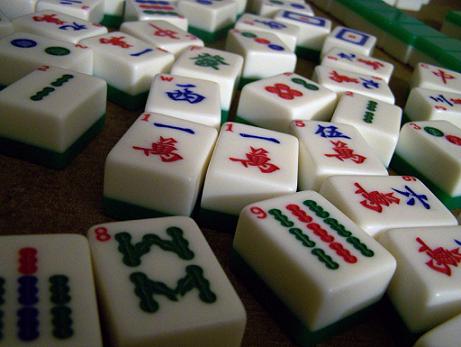Welcome to Purple Pawn, covering games played around the world by billions of people every day.
Board Game Epilepsy
29 Sep
Posted by David Miller as Card Games, Classic Board Games, Modern Board Games
 Imagine that your favorite board game made you sick. I mean, convulsing on the floor, eyes rolling back, foaming at the mouth sick! That’s what recently happened to a 52 year old Chinese man while playing Mahjong. Still, who would have imagined a tabletop game causing seizures. But after a second incident mid-game, doctors with the Zhejiang University School of Medicine diagnosed Mahjong epilepsy.
Imagine that your favorite board game made you sick. I mean, convulsing on the floor, eyes rolling back, foaming at the mouth sick! That’s what recently happened to a 52 year old Chinese man while playing Mahjong. Still, who would have imagined a tabletop game causing seizures. But after a second incident mid-game, doctors with the Zhejiang University School of Medicine diagnosed Mahjong epilepsy.
Mahjong epilepsy is a rare reflex epilepsy syndrome, a type of condition in which seizures can be brought on by certain stimuli, such as flashing lights. Mahjong epilepsy most closely resembles a cognition epilepsy subtype, in which seizures are induced by decision-making, spacial tasks, and other thought processes. There have been cases of seizures induced by writing, drawing, and performing mathematical calculations.
In a 2007 study of 23 cases, doctors in Hong Kong, however, found Mahjong epilepsy sufficiently distinctive, noted that both playing and just watching Mahjong could lead to seizures, and ruled out stress or sleep deprivation as the cause. In the recent Chinese case, the man’s doctor hypothesized that a possible trigger could have been the patterns of circles and dots found on Mahjong tiles.
Other cases of game-induced seizures have been confirmed by medical professionals. A 1965 article in the Chinese Medical Journal documented four patients with repeated epileptic seizures playing and watching games of Chess and cards. Among these cases, the sufferers would find themselves uncontrollably gesturing with their arms, standing and spinning, and losing consciousness.
Case studies in the journal Epilepsia report on an Italian man who over a period of years suffered “arrests of thought” when playing cards or Draughts, three Asian patients for whom cards and Draughts induced tonic-clonic seizures, and an American woman who experienced generalized seizures when playing Checkers.
See also the Journal of Neurology, Neurosurgery, and Psychiatry for a report on a patient who’s jerking motions and loss of consciousness were evoked by attempts to solve a Rubik’s Cube; Neurology for a study of 25 cases involving “activation of seizures by calculation, card, and board games“; and the Journal of Clinical Neurology (Korea) for information on 13 patients who experienced seizures while playing the card game Go-Stop and four patients who’s seizures were triggered by playing Baduk (Go).
No Comments
Sorry, the comment form is closed at this time.
Trending
Archives
Most Popular Articles
- The 20 Most Valuable Vintage Board Games
- Sequence Game, and Variants
- USPS Adds Board Game Flat Rate Box
- Baila, the Estonian Drinking Card Game
- The 13 Most Popular Dice Games
- The Truth About Dominoes On Sunday in Alabama
- Are Board Games Dangerous?
- Oh the Irony—Illuminati Card Game Continues to Inspire Conspiracy Theorists
- The Convoluted Story of Iron Wind Metals, Ral Partha, and Battletech Miniatures
- Guess Who? The Naked Version
Recent Posts
- Toy Fair 2019—Breaking Games
- Talisman Kingdom Hearts Edition
- Toy Fair 2019—Winning Moves
- Toy Fair 2019—Games Workshop
- Toy Fair 2019—Star Wars Lightsaber Academy
- Toy Fair 2019—Stranger Things Games
- Toy Fair 2019—HABA
- Licensing Roundup
- Game Bandit
- 2018 A Difficult Year For Hasbro But Not For D&D Or MtG
Recent Comments
- on Toy Fair 2019—Winning Moves
- on Game Bandit
- on Second Look—Dungeons & Dragons Waterdeep Dragon Heist
- on Crowdfunding Highlights
- on Beyblade SlingShock
- on Game Bandit
- on Game Bandit
- on Watch This Game!, the Board Game Review Board Game
- on Second Look—Vampire: The Masquerade 5th Edition
- on Palladium Books Loses Robotech IP License, Cancels Five-Year-Overdue Robotech RPG Tactics Kickstarter




